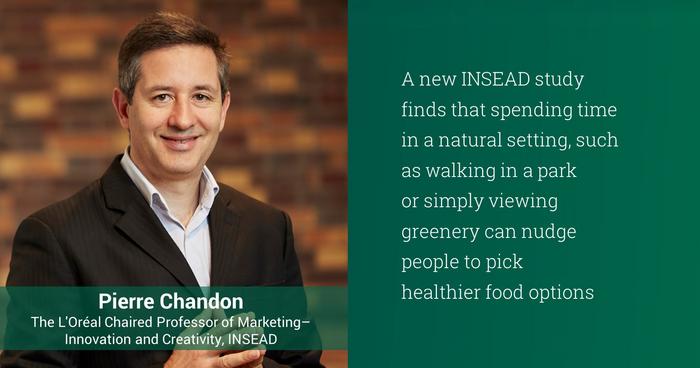Natural scenery typically conjures up positive emotions and a sense of wellbeing for most individuals. A new study by INSEAD shows that verdant views can also nudge people to pick healthier food.

Credit: INSEAD
Natural scenery typically conjures up positive emotions and a sense of wellbeing for most individuals. A new study by INSEAD shows that verdant views can also nudge people to pick healthier food.
Published in Communications Psychology, a new journal by Nature, the study suggests that spending time in a natural setting, such as walking in a park (vs. on city streets), or simply viewing greenery outside the window (vs. an urban view), leads people to make healthier food choices afterward.
“Our studies suggest that it was not the urban view that led to unhealthy food choices but rather that nature influenced people to eat healthier,” says Pierre Chandon, one of the study’s co-authors and the L’Oréal Chaired professor of marketing at INSEAD.
Your window view matters
In one study, participants were randomly assigned to take a 20-minute walk either through a park or busy streets in Paris. Afterward, all participants were offered a buffet with a mix of healthy and less healthy snacks.
While participants across both groups ate about equal amounts, those who had walked in the park displayed a clear preference for healthier choices: 70% of their selections were healthier snacks, compared to just 39% for the city walkers.
In a further, more controlled experiment, participants were placed in simulated “hotel rooms” with different window views: a green pasture, a city street, or a control condition, a blank wall with closed curtains. They were asked to choose a lunch from an in-room service menu featuring healthy and unhealthy main courses, beverages, and desserts. The results mirrored the previous experiment. Those with a view of nature opted for healthier options, while those with urban or obscured views showed less healthy preferences.
Green may be the key
The idea for this research came from co-author Maria Langlois,who noticed how she and her teammates taking part in a 7200-km charity bike ride gravitated towards healthier, unprocessed foods while biking through natural environments. Langlois, who is now an assistant professor of marketing at SMU’s Cox School of Business, turned this observation into a series of rigorous field and online studies when she enrolled in INSEAD’s PhD program.
Interestingly, the research suggests that not all natural environments have the same effect. The vividness and level of greenery in the setting could play a part. For instance, when snow covers the natural or urban views, the scenery does not influence food choices.
The researchers conducted another experiment to find out whether nature exposure increases preferences for truly healthy and natural food, or for any processed food that claims to be healthy. They offered participants three types of snacks: diet and light, healthy and natural, or tasty and indulgent. Exposure to natural scenes decreased preference for both diet snacks while significantly shifting preferences from indulgent choices towards the healthier, natural options.
Implications for an increasingly urban world
These findings hold promise for promoting healthier eating habits. Schools, companies and other organisations could utilise nature imagery in cafeterias to nudge students and employees towards healthier options. Food marketers could use natural visual cues to promote healthy or natural products.
More importantly, the research reminds us of the crucial role of urban planning. By 2050, two-thirds of the world population are expected to live in cities. Incorporating green spaces into future urban landscapes will become even more essential.
Journal
Communications Psychology
DOI
10.1038/s44271-024-00072-x
Article Title
Experiencing nature leads to healthier food choices
Article Publication Date
2-Apr-2024




